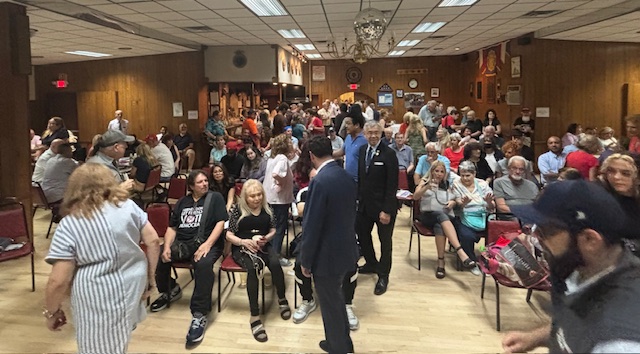BY CARL O’DONNELL AND NATHAN LAYNE
New York and Washington, the U.S. states hit the hardest by the coronavirus outbreak, are struggling to make testing for the virus widely available, with local officials estimating it could take weeks more to reach peak testing capacity.
While 1,039 people have been confirmed to have the virus in the United States – and 29 have died – according to data from Johns Hopkins University, experts estimate the real number of cases may be far greater.
An unidentified flaw in test kits distributed by the federal government in February, which gave some false results, has set the country back in containing an outbreak that has infected more than 121,000 people worldwide.
Boosting testing is crucial, disease experts say, to assessing the scope of the U.S. outbreak and identifying where it is spreading most rapidly.
Vice President Mike Pence said on March 4 that roughly 1.5 million tests would be available by the end of that week, while President Donald Trump told reporters on Friday that “anyone who wants a test, gets a test”.
But more than a week later, the ramp up has been much slower due to regulatory hurdles at the federal and state level, as well as logistical and technical challenges, according to healthcare providers, public health officials and test makers.
SUPPLY CHAIN ISSUES
Nowhere illustrates the constraints on testing more than an outbreak at the Life Care Center nursing home in Kirkland, Washington, which alone accounts for 19 of 24 coronavirus-related deaths in the state.
Despite huge concern over how quickly the virus could spread there, about 150 of the 180 staff have not been tested. Life Care Center spokesman Tim Killian said the problem was a lack of kits to test employees.
Vanessa Phelps, whose 90-year old mother is a resident at the nursing home, was tested twice for coronavirus in a single week because she had been a frequent visitor. She cannot understand why all people affiliated with Life Care have not undergone testing.
“If they don’t test everyone, one worker could still have it and be passing it around because people are still dying,” said Phelps, who ultimately tested negative.
The state has increased capacity to about 1,000 tests per day at the University of Washington School of Medicine, and local officials say they are ready to help.
Alex Greninger, assistant director of UW Medicine Clinical Virology Laboratories, said the lab was not being fully utilized due to supply-chain issues as simple as there not being people to pick up specimens and take them to the lab.
“HEIGHTENED ANXIETY”
New York has 176 confirmed coronavirus cases, second only to Washington’s 273, according to data from a interactive map compiled by John Hopkins.
On Tuesday, Governor Andrew Cuomo announced that schools, houses of worship and large gathering venues in the Manhattan suburb of New Rochelle would shut down for two weeks. In New York City, more than 2,000 people are in self-isolation over concerns they were exposed to the virus.
Cuomo said that as of last week, the state was able to run 500 tests per day and wants to increase that capacity to 1,000 daily.
The state now provides testing at two public health labs and announced on Sunday an agreement with non-profit healthcare system Northwell Health to expand testing capacity.
New York’s Department of Health has prohibited hospitals from testing patients unless they meet strict criteria, such as having traveled to a country with a high risk of infection or having contact with an infected person.
Lennox Hill Hospital in Manhattan has tested about 10 people so far, nearly all of them since the weekend after the lab at Northwell began taking samples, said Dr. Marta Feldmesser, the chief of infectious diseases.
The Northwell lab can provide results in a day, whereas the city health department was having difficulty keeping up with demand, Feldmesser said.
“The issues around testing are a lot of the reason for the heightened anxiety that we see. Because we haven’t really been able to identify who has it,” Feldmesser said. “I wish we could test anybody who wants to be tested.”
LOSING COUNT
U.S. Health and Human Services Secretary Alex Azar told CNN on Tuesday that current testing capacity was roughly 10,000 tests per day nationwide.
Azar also said the federal government has lost the ability to keep exact count of tests as local and commercial labs play a larger role in testing.
The introduction of tests by Laboratory Corporation of America Holdings <LH.N> and Quest Diagnostics Inc <DGX.N>, two of the nation’s largest diagnostic companies, is expected to greatly expand capacity beginning this week.
Quest said that it anticipated performing several thousands tests by the end of the week. LabCorp also said it can now conduct several thousands tests daily. Another major lab test provider, BioReference Laboratories, a subsidiary of OPKO Health Inc <OPK.O>, told Reuters that it expected to be able to conduct as many as 2,000 tests per day nationwide by the week’s end.
“Our door is open for any developers who want to have a test for use in the U.S.,” the Food and Drug Administration said in an emailed statement. The agency said it had received dozens of requests from parties interested in developing their own tests.































